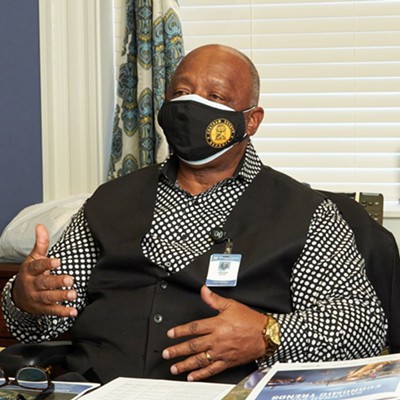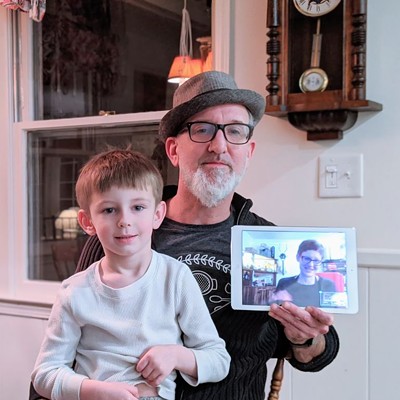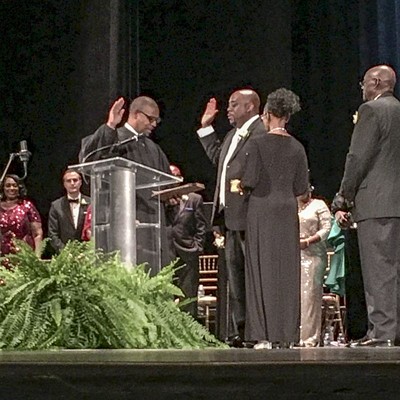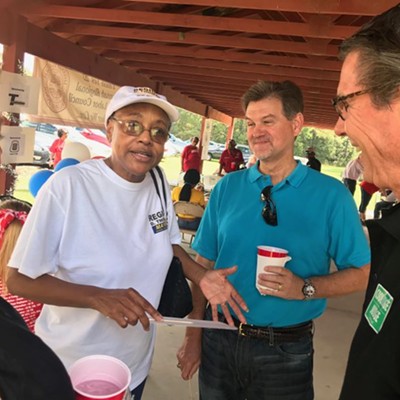IT WAS a classic David vs. Goliath scenario —only in this case David was the one unexpectedly humbled.
In one of the most eye-popping election upsets in local memory, educator and mom Jolene Byrne shocked the system by garnering an amazing 40 percent of the vote in the five-way race for Savannah/Chatham County School Board President.
David Simons—once considered an unbeatable stone-cold lead-pipe lock—finished with an anemic 21 percent, dramatically underperforming expectations for the only Republican in a race where Republican turnout was expected to be unusually high on election day.
Still, as second-place vote-getter Simons was entitled to a place in the July 22 runoff, no candidate having achieved the magic number of 50 percent plus one.
But less than 48 hours after the shellacking, Simons gracefully bowed out. (Local wags might say it’s the only graceful thing Simons did the whole campaign.)
Unless something else dramatic happens —still possible in this crazy race—Byrne now faces the third-highest vote-getter, Rev. Chester Ellis, in the July runoff.
One longtime political observer called Byrne’s bid “one of the best campaigns Chatham County has seen.”
Another told me, “This is probably the most interesting local race since John Rousakis vs. Susan Weiner in 1991.”
I concur. I’d only add that anyone who says they saw this coming, other than perhaps Byrne herself, isn’t being completely truthful.
Her campaign was based on social media, adept networking, and the endorsement of some very influential and respected community and educational leaders, such as Howard Morrison, Otis Johnson, Paul Pressly, Zelda Tenenbaum, and Martha Nesbit, among others.
And, it must be said: a good number of gaffes by Simons didn’t hurt her either.
I hope future local candidates will take note of how her campaign was run: appealing to the maximum number of people from all backgrounds as possible, while studiously avoiding the age-old pitfalls and ancient vendettas that have haunted Savannah politics for generations.
“A consultant told me early on that voters are stupid and that I should dumb down my message,” Byrne told me late last week.
“I knew he was wrong and ran on issues instead of platitudes. We stayed positive and focused on our message instead of other candidates and their issues,” she said.
In this age of cynicism, voter apathy, and ultra-polarized politics, it’s most refreshing not when we pundits are proven right, but when our assumptions are proven wrong.
This race proved SO many assumptions wrong—and in so doing, also proved there’s a glimmer of hope for our badly abused democratic process.
A few months before the election I agreed privately with every other local pundit that Byrne had virtually no realistic shot.
Then, she gained momentum. She gained friends. Went to all the meetings. Said all the right things.
Kept it clean. Kept it positive.
I had to change my mind.
About three weeks before the election I had adjusted my stance to admit she was capable of squeaking into a runoff. This was based not only on Byrne’s hard work, earnestness, and networking ability, but on conversations with local Republicans who were not only not supporting Simons, but were actively working against him.
Fast forward to a week or so before election day. I observed that if my Facebook feed was any indication, Byrne would get 99 percent of the vote.
It was mostly a tongue in cheek observation. The last local candidate who blew up Facebook like that was Ruel Joyner, whose very worthwhile and hard-fought bid for City Council in 2011 resulted in only 17 percent of the vote.
Byrne didn’t end up with 99 percent, but her 40 percent was stunning enough proof of the efficacy of her campaign’s appeal.
“Many in the community resonated with our message, particularly replicating our models of success and ensuring that all our children go to excellent schools,” Byrne tells me. “It’s a nonpartisan position, and we have support from all sides.”
The old Reagan/Bush-era tactics which served Simons well in his years as a campaign consultant, such as his own pledge to never raise taxes by a single penny, don’t have the same appeal in the Obama era.
Such tactics might still work in Republican primaries, but that’s the thing: Contrary to how Simons ran his campaign, it wasn’t actually one of the Republican primaries that day. His game plan was to solely rely on maximized Republican turnout, but the schools race obviously meant more to Chatham voters than just party label.
Another interesting thing:
The other three candidates in the School Board President election—Chester Ellis, George Seaborough, and Sadie Brown—together combined for about 38 percent of the vote, nearly the same total as Byrne’s.
Unlike Byrne and Simons, all three are African-American.
(If you don’t think race matters in Chatham County politics... welcome to Chatham County! You’re obviously new here. If you don’t think race should be so important in local politics, welcome to the club!)
And in no other area of Savannah life does race play as big a role as in the public school system, a district which only finished desegregating a scant 43 years ago.
As we go to press, there was behind-the scenes buzz about Ellis and the rest of the candidates possibly dropping out and clearing the decks for Byrne, to avoid a potentially bitter battle along racial lines that would make a new School Board President’s job even more difficult than it already is.
As of this writing though, it appears that Ellis is staying in the race—as is absolutely his right.
I see nothing in the personalities or platforms of Ms. Byrne or Rev. Ellis to indicate that either will now take the low road.
It’s my fervent hope that, as with Byrne’s success May 20, the pundits and their cynical old assumptions will all be proven obsolete again, in the heat of July.































